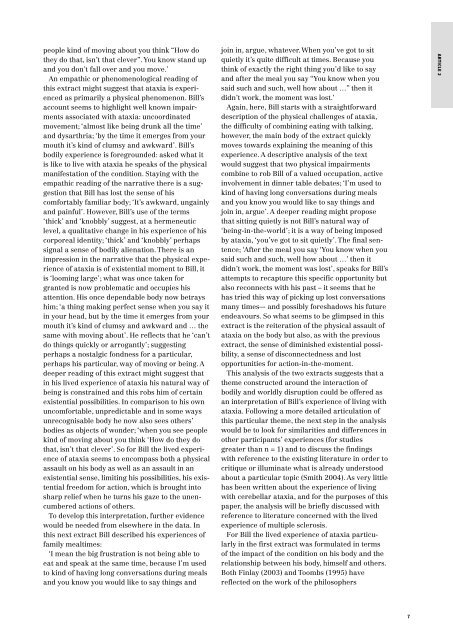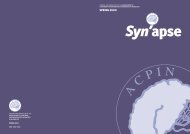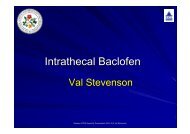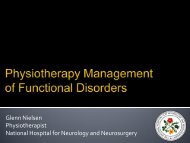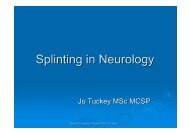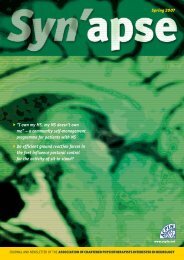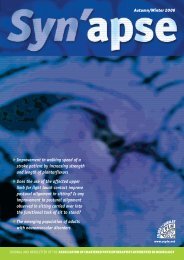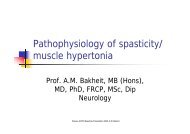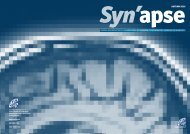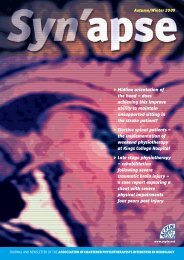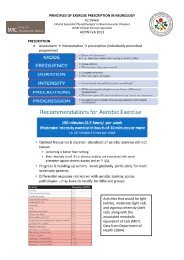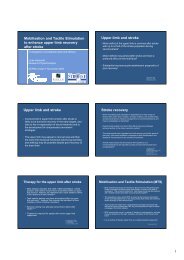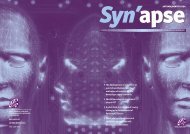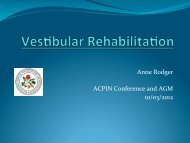SYNAPSE Spring 2009 - acpin
SYNAPSE Spring 2009 - acpin
SYNAPSE Spring 2009 - acpin
Create successful ePaper yourself
Turn your PDF publications into a flip-book with our unique Google optimized e-Paper software.
people kind of moving about you think “How do<br />
they do that, isn’t that clever”. You know stand up<br />
and you don’t fall over and you move.’<br />
An empathic or phenomenological reading of<br />
this extract might suggest that ataxia is experienced<br />
as primarily a physical phenomenon. Bill’s<br />
account seems to highlight well known impairments<br />
associated with ataxia: uncoordinated<br />
movement; ‘almost like being drunk all the time’<br />
and dysarthria; ‘by the time it emerges from your<br />
mouth it’s kind of clumsy and awkward’. Bill’s<br />
bodily experience is foregrounded: asked what it<br />
is like to live with ataxia he speaks of the physical<br />
manifestation of the condition. Staying with the<br />
empathic reading of the narrative there is a suggestion<br />
that Bill has lost the sense of his<br />
comfortably familiar body; ‘It’s awkward, ungainly<br />
and painful’. However, Bill’s use of the terms<br />
‘thick’ and ‘knobbly’ suggest, at a hermeneutic<br />
level, a qualitative change in his experience of his<br />
corporeal identity; ‘thick’ and ‘knobbly’ perhaps<br />
signal a sense of bodily alienation. There is an<br />
impression in the narrative that the physical experience<br />
of ataxia is of existential moment to Bill, it<br />
is ‘looming large’; what was once taken for<br />
granted is now problematic and occupies his<br />
attention. His once dependable body now betrays<br />
him; ‘a thing making perfect sense when you say it<br />
in your head, but by the time it emerges from your<br />
mouth it’s kind of clumsy and awkward and … the<br />
same with moving about’. He reflects that he ‘can’t<br />
do things quickly or arrogantly’; suggesting<br />
perhaps a nostalgic fondness for a particular,<br />
perhaps his particular, way of moving or being. A<br />
deeper reading of this extract might suggest that<br />
in his lived experience of ataxia his natural way of<br />
being is constrained and this robs him of certain<br />
existential possibilities. In comparison to his own<br />
uncomfortable, unpredictable and in some ways<br />
unrecognisable body he now also sees others’<br />
bodies as objects of wonder; ‘when you see people<br />
kind of moving about you think ‘How do they do<br />
that, isn’t that clever’. So for Bill the lived experience<br />
of ataxia seems to encompass both a physical<br />
assault on his body as well as an assault in an<br />
existential sense, limiting his possibilities, his existential<br />
freedom for action, which is brought into<br />
sharp relief when he turns his gaze to the unencumbered<br />
actions of others.<br />
To develop this interpretation, further evidence<br />
would be needed from elsewhere in the data. In<br />
this next extract Bill described his experiences of<br />
family mealtimes:<br />
‘I mean the big frustration is not being able to<br />
eat and speak at the same time, because I’m used<br />
to kind of having long conversations during meals<br />
and you know you would like to say things and<br />
join in, argue, whatever. When you’ve got to sit<br />
quietly it’s quite difficult at times. Because you<br />
think of exactly the right thing you’d like to say<br />
and after the meal you say “You know when you<br />
said such and such, well how about …” then it<br />
didn’t work, the moment was lost.’<br />
Again, here, Bill starts with a straightforward<br />
description of the physical challenges of ataxia,<br />
the difficulty of combining eating with talking,<br />
however, the main body of the extract quickly<br />
moves towards explaining the meaning of this<br />
experience. A descriptive analysis of the text<br />
would suggest that two physical impairments<br />
combine to rob Bill of a valued occupation, active<br />
involvement in dinner table debates; ‘I’m used to<br />
kind of having long conversations during meals<br />
and you know you would like to say things and<br />
join in, argue’. A deeper reading might propose<br />
that sitting quietly is not Bill’s natural way of<br />
‘being-in-the-world’; it is a way of being imposed<br />
by ataxia, ‘you’ve got to sit quietly’. The final sentence;<br />
‘After the meal you say ‘You know when you<br />
said such and such, well how about …’ then it<br />
didn’t work, the moment was lost’, speaks for Bill’s<br />
attempts to recapture this specific opportunity but<br />
also reconnects with his past – it seems that he<br />
has tried this way of picking up lost conversations<br />
many times–- and possibly foreshadows his future<br />
endeavours. So what seems to be glimpsed in this<br />
extract is the reiteration of the physical assault of<br />
ataxia on the body but also, as with the previous<br />
extract, the sense of diminished existential possibility,<br />
a sense of disconnectedness and lost<br />
opportunities for action-in-the-moment.<br />
This analysis of the two extracts suggests that a<br />
theme constructed around the interaction of<br />
bodily and worldly disruption could be offered as<br />
an interpretation of Bill’s experience of living with<br />
ataxia. Following a more detailed articulation of<br />
this particular theme, the next step in the analysis<br />
would be to look for similarities and differences in<br />
other participants’ experiences (for studies<br />
greater than n = 1) and to discuss the findings<br />
with reference to the existing literature in order to<br />
critique or illuminate what is already understood<br />
about a particular topic (Smith 2004). As very little<br />
has been written about the experience of living<br />
with cerebellar ataxia, and for the purposes of this<br />
paper, the analysis will be briefly discussed with<br />
reference to literature concerned with the lived<br />
experience of multiple sclerosis.<br />
For Bill the lived experience of ataxia particularly<br />
in the first extract was formulated in terms<br />
of the impact of the condition on his body and the<br />
relationship between his body, himself and others.<br />
Both Finlay (2003) and Toombs (1995) have<br />
reflected on the work of the philosophers<br />
ARTICLE 2<br />
7


